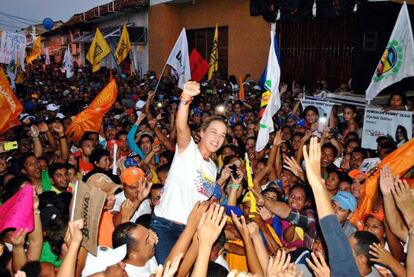Violence breaks out as election season gets going in Venezuela
The country’s opposition reports five attacks, two at gunpoint, against its candidates Lilian Tintori, wife of imprisoned leader Leopoldo López, says her life is in danger

It has been 13 days since campaign season for the upcoming parliamentary elections on December 6 began in Venezuela and the opposition has already reported five attacks - two involving weapons - against its candidates. The last one took place on Wednesday afternoon when Luis Manuel Díaz, a Democratic Action leader, was killed in Altagracia de Oruco (Guárico state, Venezuelan Plains). Lilian Tintori, the wife of imprisoned opposition leader Leopoldo López, was also present at the event.
The initial accounts say Díaz, who was also a union leader, was shot several times toward the end of a gathering held by Democratic Unity Roundtable (MUD), a coalition of opposition of groups. The day after, Tintori reported that there had also been several attempts on her life.
President Maduro said evidence indicates that Díaz’s death was the result of skirmishes between rival gangs
Democratic Action Secretary General Henry Ramos Allup confirmed the news of the shooting via Twitter and blamed “armed groups” affiliated with the ruling United Socialist Party of Venezuela for the murder. Witnesses say the rally was a peaceful event until a volley of gunshots was fired.
President Nicolás Maduro said evidence indicates that Díaz’s death was the result of skirmishes between rival gangs. “The Ministry of Interior already has evidence that points to a group of hitmen who were settling scores between rival gangs,” he said. The opposition flatly refutes this explanation.
The Venezuelan Interior Ministry has put two prosecutors on the investigation. Ombudsman Tarek William Saab said the government has already identified a material suspect.
The government is trying to shield its supporters from any responsibility for the incident. Since late 2000, when the Venezuelan government contributed to the breakup of the country’s union movement, armed gangs control construction jobs, and rival groups often settle differences with bullets.
Opposition leaders have emphasized the connection between this murder and the attacks made on candidate Miguel Pizarro. Pizarro was shot at in Petare, a shantytown in east Caracas, and he has been the victim of harassment at rallies held by Miranda state Governor Henrique Capriles Radonski and Tomás Guanipa, a candidate for a Caracas district.
The Union of South American Nations (UNASUR), Spanish Prime Minister Mariano Rajoy, and Organization of American States (OAS) Secretary General Luis Almagro unanimously condemned the assassination, Silvia Ayuso reports from Washington. “The assassination of a political leader is a deadly wound for democracy,” Almagro said. “And a series of acts of political violence during an electoral process has killed many democracies.”
A series of acts of political violence during an electoral process has killed many democracies”
Until now, the chavist regime had never faced an election with lower voter support than its rivals. The government is grappling with high inflation, chronic food shortages, and the collapse of the Venezuelan economy. As a result, the country is being forced to import most goods and services. The current gap in the polls sees the government between 20 and 30 points down on the opposition – a gap it will have to close if it is to maintain its parliamentary majority.
But election results are likely to reflect a different reality, given that the polls are organized to favor the interests of a regime that uses government resources to rally voters. The administration has started a campaign of fear to warn the electorate that it may lose social assistance programs if the opposition controls parliament. And the opposition has a weak spot: it does not have sufficient resources to place its own observers at polling stations in the country and thus prevent fraud.
Some of the fear comes from hearing the words of the president himself. Over the last few weeks, Maduro has warned that the revolution should win “at all costs.” In the second-to-last episode of his program, the president raised his tone. “Start praying, right-wing oligarchs, because the revolution will triumph on December 6. Start praying now for peace and calm. Because if not, we are going to the streets, and in the streets, we are candanga con burundanga [a group dedicated to anarchy]. We revolutionaries are better as we are now, so quiet, giving out pensions to the elderly, housing to the people and public education. And everyone is happy.”
English version by Dyane Jean Francois.
Tu suscripción se está usando en otro dispositivo
¿Quieres añadir otro usuario a tu suscripción?
Si continúas leyendo en este dispositivo, no se podrá leer en el otro.
FlechaTu suscripción se está usando en otro dispositivo y solo puedes acceder a EL PAÍS desde un dispositivo a la vez.
Si quieres compartir tu cuenta, cambia tu suscripción a la modalidad Premium, así podrás añadir otro usuario. Cada uno accederá con su propia cuenta de email, lo que os permitirá personalizar vuestra experiencia en EL PAÍS.
¿Tienes una suscripción de empresa? Accede aquí para contratar más cuentas.
En el caso de no saber quién está usando tu cuenta, te recomendamos cambiar tu contraseña aquí.
Si decides continuar compartiendo tu cuenta, este mensaje se mostrará en tu dispositivo y en el de la otra persona que está usando tu cuenta de forma indefinida, afectando a tu experiencia de lectura. Puedes consultar aquí los términos y condiciones de la suscripción digital.








































